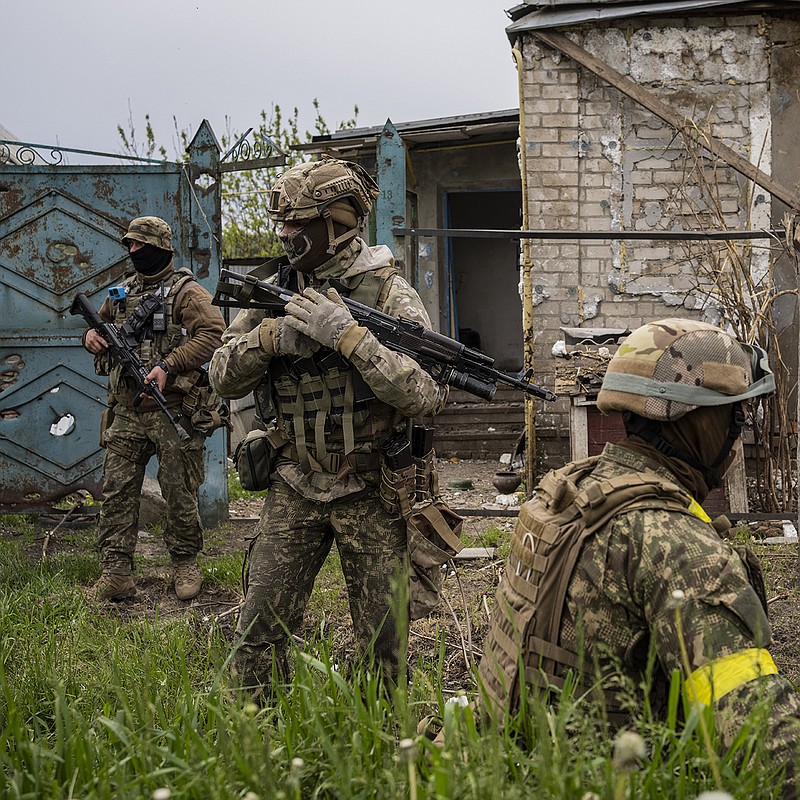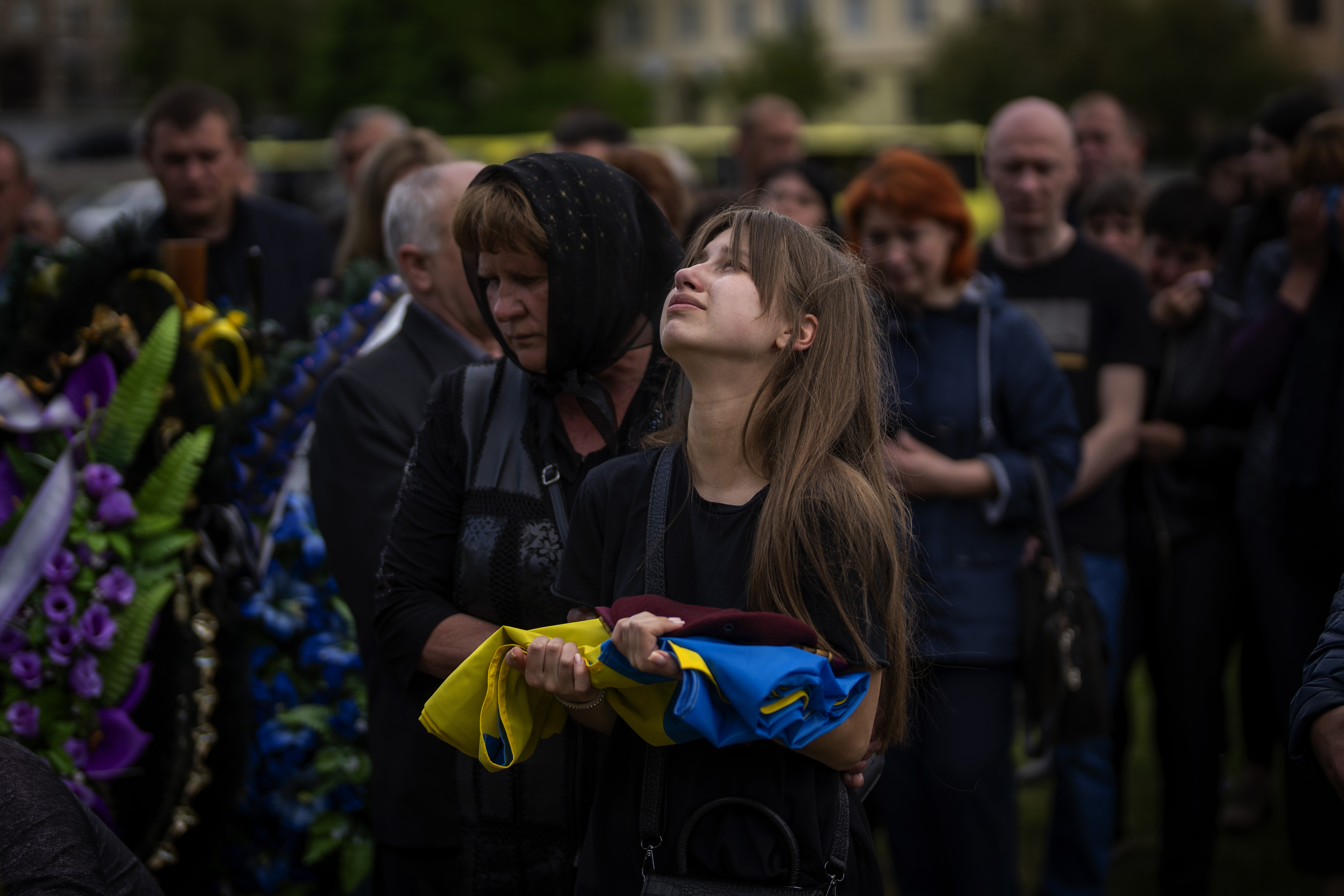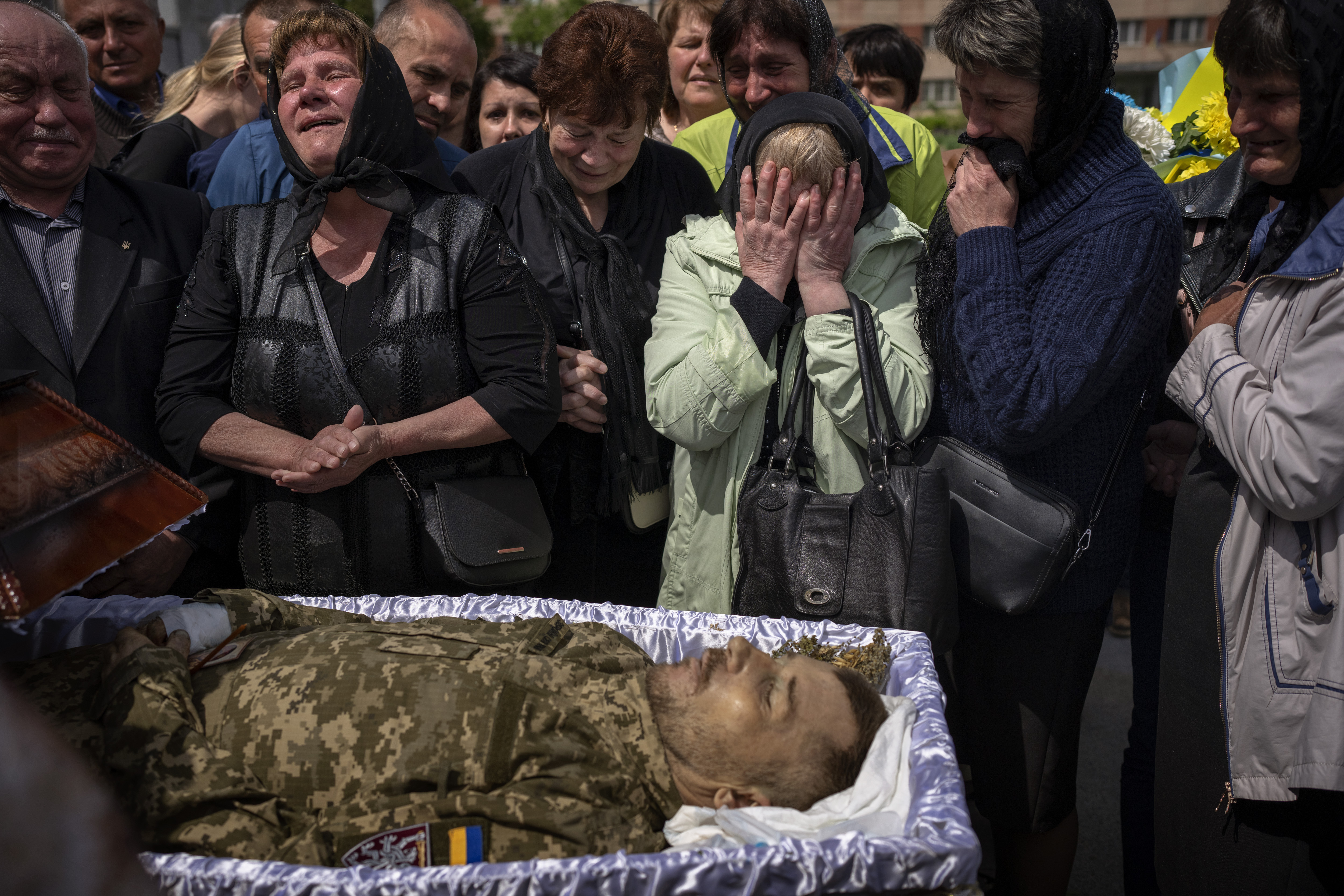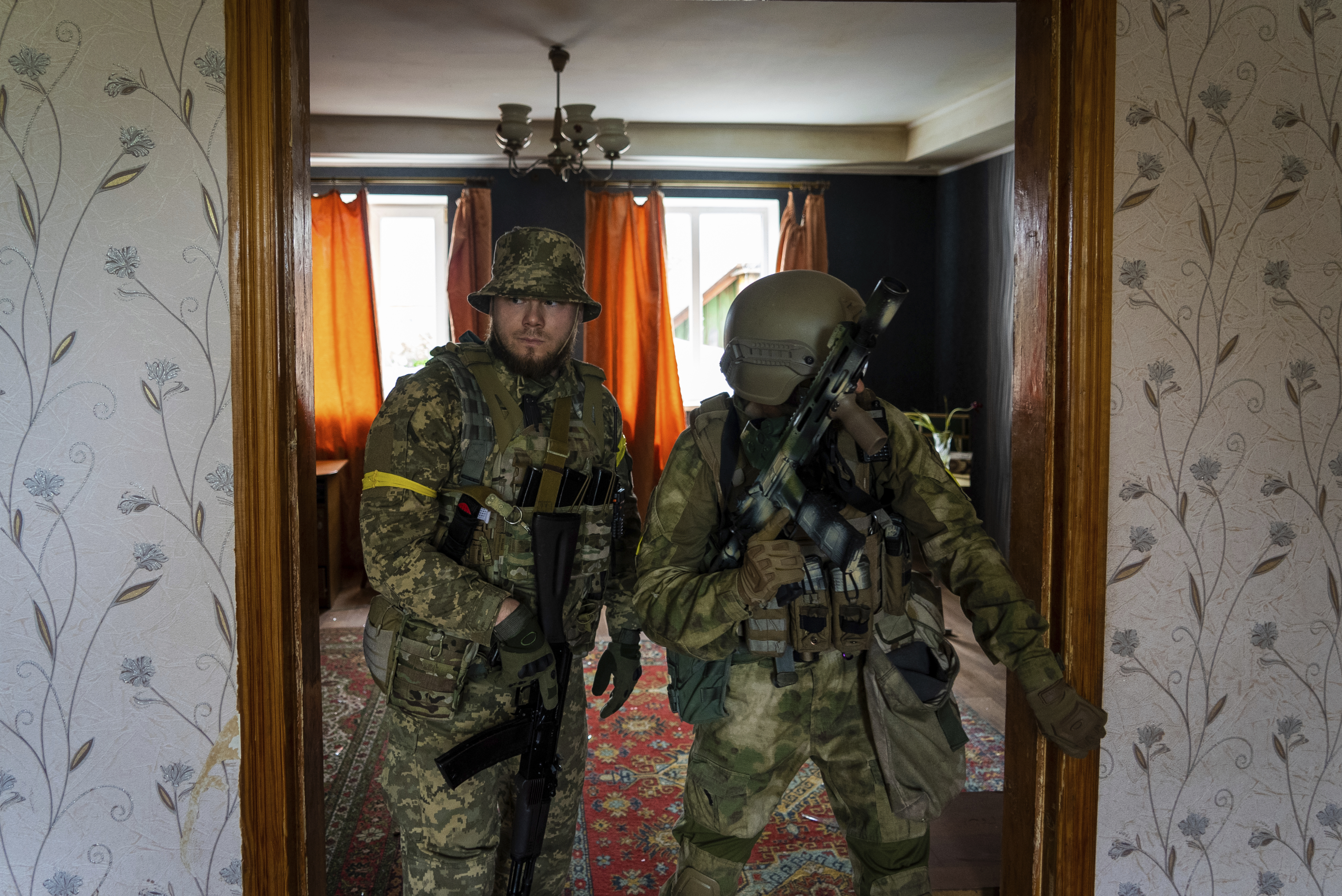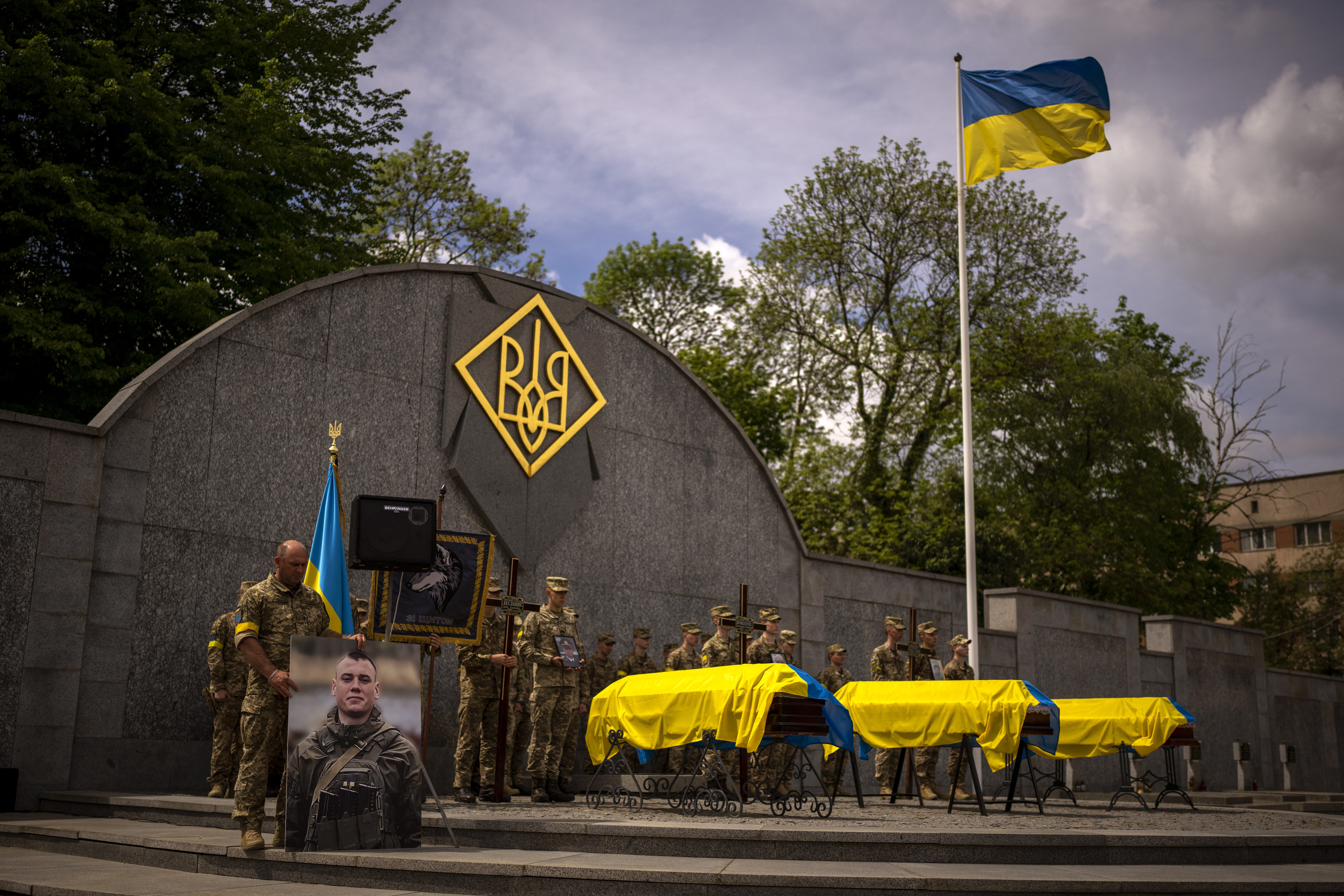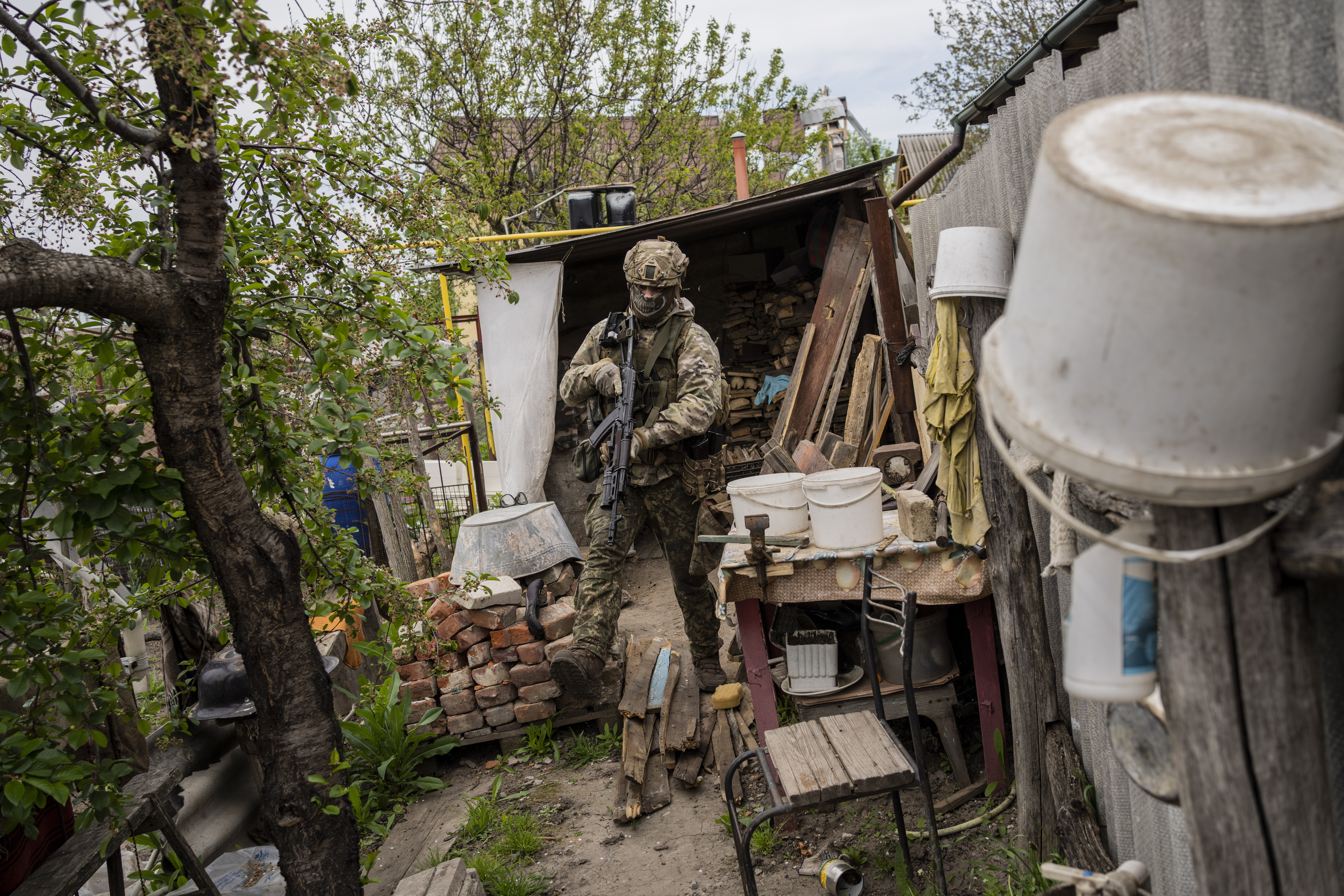KYIV, Ukraine -- Russian troops were withdrawing from around Ukraine's second-largest city after bombarding it for weeks, the Ukrainian military said Saturday, as Kyiv and Moscow's forces engaged in a battle for the country's eastern industrial heartland.
Ukraine's military said the Russian forces were pulling back from the northeastern city of Kharkiv and focusing on guarding supply routes, while launching mortar, artillery and airstrikes in the eastern province of Donetsk in order to "deplete Ukrainian forces and destroy fortifications."
Defense Minister Oleksii Reznikov said Ukraine was "entering a new -- long-term -- phase of the war."
After failing to capture Kyiv early in the invasion of Ukraine, Russian President Vladimir Putin has shifted his focus eastward to the Donbas, an industrial region where Ukraine has battled Moscow-backed separatists since 2014.
The offensive aims to encircle Ukraine's most experienced and best-equipped troops, who are deployed in the east, and to seize parts of the Donbas that remain in Ukraine's control.
Airstrikes and artillery barrages make it dangerous for journalists to move around in the east, hindering efforts to get a full picture of the fighting. But it appears to be a back-and-forth slog without major breakthroughs on either side.
Russia has captured some Donbas villages and towns, including Rubizhne, which had a prewar population of around 55,000.
Ukrainian President Volodymyr Zelenskyy said Ukraine's forces have also made progress in the east, retaking six towns or villages in the past day. In his nightly address Saturday, he said "the situation in Donbas remains very difficult" and Russian troops were "still trying to come out at least somewhat victorious."
"Step by step," Zelenskyy the president said, "we are forcing the occupants to leave the Ukrainian land."
Kharkiv, which is near the Russian border and only 50 miles southwest of the Russian city of Belgorod, has undergone weeks of intense shelling. The largely Russian-speaking city with a prewar population of 1.4 million was a key military objective earlier in the war, when Moscow hoped to capture and hold major cities.
Ukraine "appears to have won the Battle of Kharkiv," the Institute for the Study of War, a Washington-based think tank, said. "Ukrainian forces prevented Russian troops from encircling, let alone seizing Kharkiv, and then expelled them from around the city, as they did to Russian forces attempting to seize Kyiv."
Regional Gov. Oleh Sinegubov said via the Telegram messaging app that there had been no shelling attacks on Kharkiv in the past day.
He added that Ukraine launched a counteroffensive near Izyum, a city 78 miles south of Kharkiv that has been held by Russia since at least the beginning of April.
Fighting was fierce on the Siversky Donets River near the city of Severodonetsk, where Ukraine has launched counterattacks but failed to halt Russia's advance, said Oleh Zhdanov, an independent Ukrainian military analyst.
"The fate of a large portion of the Ukrainian army is being decided -- there are about 40,000 Ukrainian soldiers," he said.
However, Russian forces suffered heavy losses in a Ukrainian attack that destroyed a pontoon bridge they were using to try to cross the same river in the town of Bilohorivka, Ukrainian and British officials said.
Britain's defense ministry said Russia lost "significant armored maneuver elements" of at least one battalion tactical group in the attack. A Russian battalion tactical group consists of about 1,000 troops.
The ministry said the risky river crossing was a sign of "the pressure the Russian commanders are under to make progress in their operations in eastern Ukraine."
FOOD CRISIS WARNING
Meanwhile, Zelenskyy has warned of a global food crisis as Russia blockades Ukrainian grain from leaving port.
The Group of Seven leading economies echoed that Saturday, saying "Russia's war of aggression has generated one of the most severe food and energy crises in recent history, which now threatens those most vulnerable across the globe."
German Foreign Minister Annalena Baerbock, who hosted a meeting of top G-7 diplomats, said the war had become a "global crisis."
She said up to 50 million people, particularly in Africa and the Middle East, would face hunger in the coming months unless ways are found to release Ukrainian grain, which accounts for a sizeable share of the worldwide supply.
In statements released at the end of the three-day meeting on Germany's Baltic Sea coast, the G-7 pledged to provide further humanitarian aid to the most vulnerable.
"We are determined to accelerate a coordinated multilateral response to preserve global food security and stand by our most vulnerable partners in this respect," it added.
Canada's foreign minister, Melanie Joly, said her country, another major agricultural exporter, stands ready to send ships to European ports so Ukrainian grain can be brought to those in need.
"We need to make sure that these cereals are sent to the world," she told reporters. "If not, millions of people will be facing famine."
Russia dismissed the claim that it was responsible for worsening global hunger and driving up food prices.
"Prices are rising because of sanctions imposed by the West under pressure of the USA," said Russian Foreign Ministry spokeswoman Maria Zakharova. "Failure to understand this is a sign either of stupidity or intentional misleading of the public."
The G-7 nations also called on China not to help Russia, including by undermining international sanctions or justifying Moscow's actions in Ukraine.
Beijing should support the sovereignty and independence of Ukraine, and not "assist Russia in its war of aggression," they said.
The G-7 urged China "to desist from engaging in information manipulation, disinformation and other means to legitimize Russia's war of aggression against Ukraine."
The grouping, which comprises Britain, Canada, France, Germany, Italy, Japan and the United States, also reiterated its stance that the territories seized by Russian forces need to be returned to Ukraine.
"We will never recognize borders Russia has attempted to change by military aggression," they said.
On Friday, Ukrainian Foreign Minister Dmytro Kuleba appealed to friendly countries to provide more military support to Kyiv and increase the pressure on Russia, including by seizing its assets abroad to pay for rebuilding Ukraine.
Kuleba said his country remains willing to talk to Russia about unblocking grain supplies stuck in Ukraine's silos and also about reaching a political agreement to end the war itself, but had so far received "no positive feedback" from Moscow.
German Chancellor Olaf Scholz said in an interview published Saturday that he had not detected any change in Putin's stance recently.
Scholz, who spoke at length by phone with the Russian leader Friday, told German news portal t-online that Putin had failed to achieve the military objectives he set out at the start of the war while losing more Russian soldiers than the Soviet Union did during its decade-long campaign in Afghanistan.
"Putin should slowly begin to understand that the only way out of this situation is through an agreement with Ukraine," Scholz was quoted as saying.
One idea discussed at the G-7 meeting was whether Russian state assets frozen abroad can be used to pay for the reconstruction of Ukraine.
"Russia bears responsibility for the massive damage resulting from this war," Baerbock said. "And that's why it's a question of justice that Russia should have to pay for this damage."
But she added that, unlike in Canada -- where legislation allows for seized funds to be repurposed -- the legal basis for doing so in Germany is uncertain.
"But that's precisely what such meetings are for, to have an exchange about how to resolve these legal questions," Baerbock said.
Many of the foreign ministers traveled straight on to an informal meeting of NATO diplomats in Berlin on Saturday and today.
That gathering will consider moves by Finland and Sweden to join the military alliance amid concerns about the threat from Russia, as well as ways in which NATO can support Ukraine without being drawn into the conflict.
NEGATIVE IMPACT
Putin launched the war in Ukraine aiming to thwart NATO's expansion in Eastern Europe. He warned his Finnish counterpart Saturday that relations between the two neighbors could be "negatively affected" if Finland follows through with plans to apply for NATO membership.
The Kremlin's press service said that Putin told Sauli Niinisto Finland's abandonment "of its traditional policy of military neutrality would be an error since there are no threats to Finland's security."
"Such a change in the country's foreign policy could negatively affect Russian-Finnish relations, which had been built in the spirit of good neighborliness and partnership for many years, and were mutually beneficial," the statement added.
The response came after Niinisto told Putin in a phone conversation that the militarily non-aligned Nordic country, which has a complex history with its eastern neighbor, "will decide to apply for NATO membership in the coming days."
Niinisto's office said the Finnish head of state told Putin how starkly Finland's security environment had changed after Moscow's Feb. 24 invasion of Ukraine, and pointed to Russia's demands for Finland to refrain from seeking membership of the 30-nation Western military alliance.
"The discussion (with Putin) was straightforward and unambiguous and was held without exaggeration. Avoiding tensions was considered important," said Niinisto, Finland's president since 2012 and one of a handful of Western leaders who has been in regular dialogue with Putin over the past decade.
Niinisto pointed out that he had already told Putin at their first meeting in 2012 that "each independent nation would maximize its own security."
"That is still the case. By joining NATO, Finland will strengthen its own security and assume its responsibilities," Niinisto said.
Niinisto stressed that Finland, despite its likely future membership in NATO, wants to continue to deal with Russia bilaterally in "practical issues generated by the border neighborhood" and hopes to engage with Moscow "in a professional manner."
According to the Kremlin statement, the two leaders also discussed Russia's "military operation" in Ukraine, and the possibility of achieving a political solution. Putin said negotiations between Moscow and Kyiv had been suspended due to Ukraine's "lack of interest in a serious and constructive dialogue."
The phone call was conducted on Finland's initiative, Niinisto's office said.
Finland shares an 830-mile border with Russia, the longest of any European Union member.
Niinisto and Finnish Prime Minister Sanna Marin on Thursday jointly endorsed their country's NATO bid and recommended that Finland "must apply for NATO membership without delay" to guarantee its security.
A formal announcement from Niinisto and Marin of Finland's intention to apply for NATO membership is expected today. Marin's governing Social Democratic Party approved the membership bid on Saturday, paving way for a parliamentary vote this week to endorse the move. It's expected to pass with overwhelming support. A formal membership application would then be submitted to NATO headquarters in Brussels.
Neighboring Sweden is set to decide on its NATO stance today at a meeting of the governing Social Democratic Party led by Prime Minister Magdalena Andersson.
One possible hurdle to Finland and Sweden joining the alliance came from NATO member Turkey, whose president said Friday he was "not favorable" to the idea.
Finland's Foreign Minister Pekka Haavisto said Saturday that he had already called his Turkish counterpart, Mevlut Cavusoglu, "to take the tensions down."
"I'm sure that we will find a solution to this item as well," he told reporters at the start of an informal NATO foreign ministers' meeting in Berlin late Saturday.
U.S. President Joe Biden held a joint call Friday with Niinisto and Andersson where, according to a White House statement, he "underscored his support for NATO's Open Door policy and for the right of Finland and Sweden to decide their own future, foreign policy and security arrangements."
Russian Deputy Foreign Minister Alexander Grushko said accession to NATO by Finland and Sweden would heighten security tensions in the Arctic, "turning it into an arena of military competition."
Russian energy group Inter RAO suspended deliveries of electricity to Finland on Saturday, according to a statement from the Finnish national electrical grid operator. But only around 10% of Finland's electricity comes from Russia, and authorities did not expect shortages.
Information for this article was contributed by Oleksandr Stashevskyi, David Keyton, Yesica Fisch, Yuras Karmanau, Mstyslav Chernov, Elena Becatoros, Jill Lawless, Frank Jordans, Jari Tanner and staff members of The Associated Press.
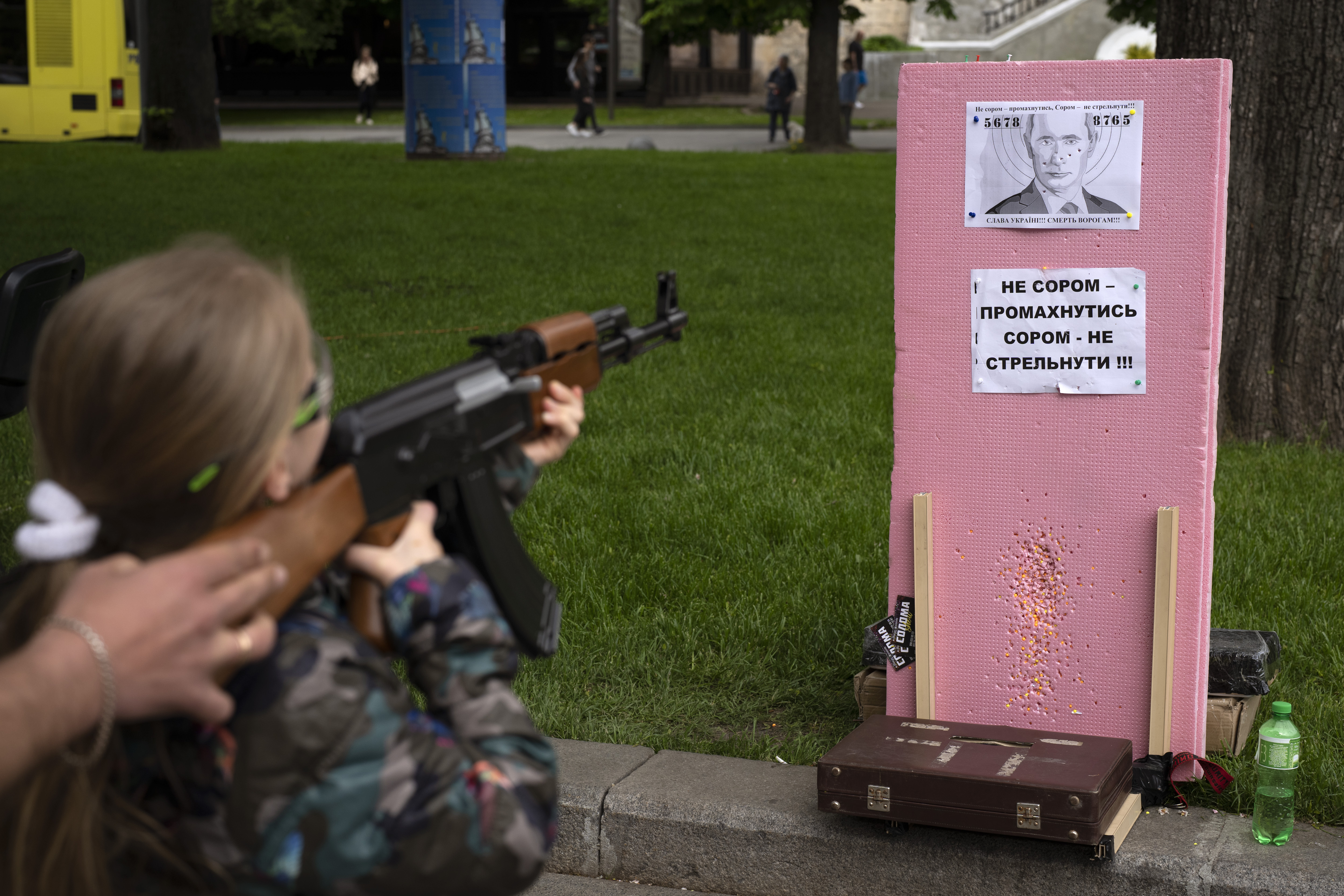 Victoria, 7, uses a plastic Kalashnikov rifle to shoot balls at a portrait of Russian President Vladimir Putin, at a street attraction in the centre of Lviv, Ukraine on Saturday, May 14, 2022. The banner reads in Ukrainian: It's not a shame to miss. It's a shame not to try to shoot! Glory to Ukraine, Death to our enemies!. (AP Photo/Emilio Morenatti)
Victoria, 7, uses a plastic Kalashnikov rifle to shoot balls at a portrait of Russian President Vladimir Putin, at a street attraction in the centre of Lviv, Ukraine on Saturday, May 14, 2022. The banner reads in Ukrainian: It's not a shame to miss. It's a shame not to try to shoot! Glory to Ukraine, Death to our enemies!. (AP Photo/Emilio Morenatti)Gallery: Images from Ukraine, month 3
